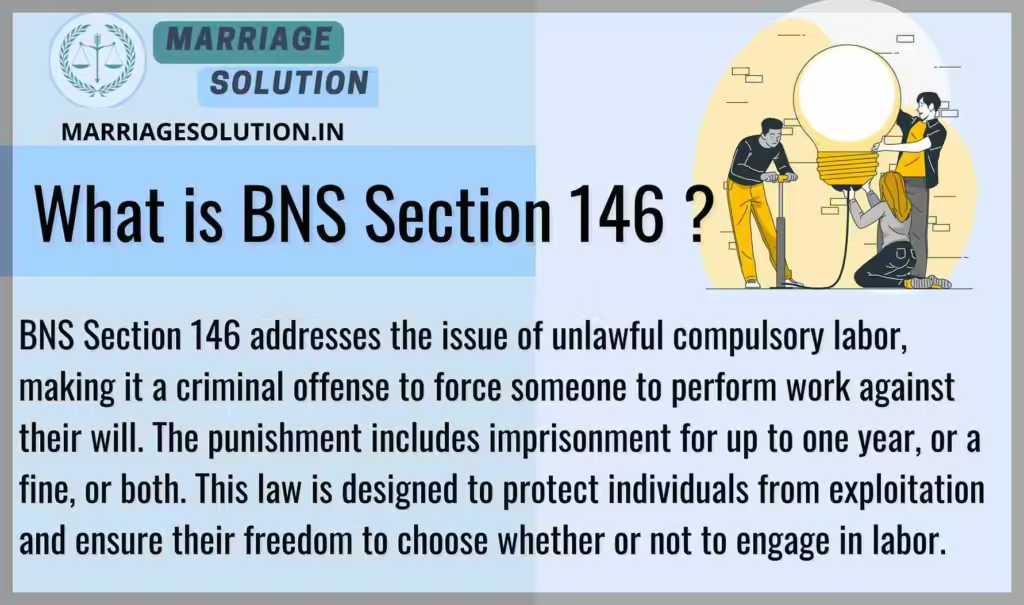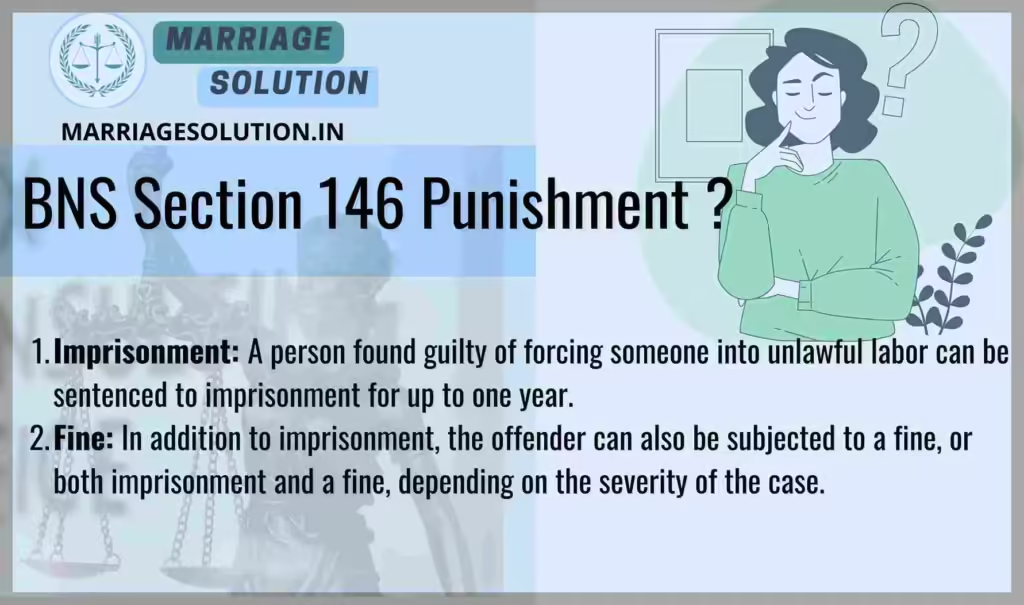Introduction of Section 146 BNS
BNS 146 addresses the issue of unlawful compulsory labor, making it a crime to force any person to work against their will. It protects individual freedom and dignity by ensuring that all forms of work must be based on free consent. Anyone found guilty of compelling another person into labor can face imprisonment up to one year, a fine, or both. The law reflects India’s constitutional safeguards against forced labor under Article 23, reinforcing the nation’s commitment to human rights and dignity.
The Bharatiya Nyaya Sanhita (BNS) Section 146 replaces the old Indian Penal Code (IPC) Section 374.
What is section 146 of BNS ?
BNS Section 146 addresses the issue of unlawful compulsory labor, making it a criminal offense to force someone to perform work against their will. The punishment includes imprisonment for up to one year, or a fine, or both. This law is designed to protect individuals from exploitation and ensure their freedom to choose whether or not to engage in labor.

Under Section 146 of the bns act 2023
“Whoever unlawfully compels any person to labour against the will of that person, shall be punished with imprisonment for a term which may extend to one year, or with fine, or with both.”
Explanation of Section 146
Section 146 punishes the act of forcing anyone to work against their will. It ensures that personal liberty and human dignity are protected, making unlawful compulsory labor a punishable crime.
- If a person coerces, threatens, or compels another to perform work without their free consent → this section applies.
- The punishment can be imprisonment up to 1 year, a fine, or both.
- The offense is:
- Cognizable → Police can arrest without warrant.
- Bailable → Accused can apply for bail.
- Non-compoundable → Case cannot be privately settled.
- Trial by any Magistrate → Simpler trial process in lower courts.
Key Elements of Section 146
- Covers All Labor → Applies to physical or mental work imposed unlawfully.
- Consent is Central → If labor is not voluntary, it becomes unlawful.
- Punishment → Up to 1 year imprisonment or fine, or both.
- Cognizable Offense → Police can take quick action without a warrant.
- Bailable → Accused may secure bail.
- Non-compoundable → Must go through judicial process.
- Trial by Magistrate → Any Magistrate can hear such cases.
- Human Dignity Focus → Protects individuals from forced or exploitative labor.
Examples of BNS Section 146
Example 1:
A factory owner threatens a laborer with violence if they stop working, forcing them to continue against their will.
Covered under Section 146 → punishment up to 1 year imprisonment + fine.
Example 2:
A landlord forces villagers to work in his fields without pay, not allowing them to leave.
This unlawful compulsory labor falls under Section 146, making the landlord punishable.
Why Section 146 is Important
- Protects Liberty → No one should be forced into work without choice.
- Prevents Exploitation → Stops misuse of power by employers or others.
- Supports Human Rights → Reflects constitutional protection against forced labor (Article 23 of Indian Constitution).
- Legal Deterrence → Punishment discourages unlawful labor practices.
- Accessible Trial → Handled by Magistrates for quicker justice.
Section 146 BNS Overview
BNS Section 146 deals with unlawful compulsory labor, making it illegal to force anyone to work against their will. This section is intended to protect individual freedom and dignity by ensuring that no one is subjected to labor without their consent. The law prescribes punishment in the form of imprisonment, a fine, or both, for anyone found guilty of forcing a person into labor unlawfully.
BNS Section 146: 10 Key Points in Detail
Applies to All Forms of Labor:
This section covers all forms of labor, whether physical or mental, ensuring that no person can be coerced into working in any capacity against their will.
Protection of Personal Liberty:
This section safeguards an individual’s personal liberty by prohibiting any form of forced labor. It ensures that no one can be made to work without their free and voluntary consent.
Imprisonment for the Offender:
Anyone found guilty of forcing another person to work against their will can face imprisonment for up to one year, depending on the seriousness of the offense and other circumstances.
Fine as an Additional Punishment:
Besides imprisonment, the court may impose a fine on the guilty party. This dual penalty system serves as a deterrent to those considering forcing others into labor.
Bailable Offense:
Since BNS Section 146 is a bailable offense, the accused can be released on bail during the legal proceedings, ensuring their liberty while the case is pending.
Cognizable Offense:
The offense is classified as cognizable, meaning the police can arrest the accused without the need for a court-issued warrant, ensuring swift action in cases of forced labor.
Non-Compoundable Offense:
The offense cannot be settled out of court. It must go through the judicial process, and no private settlement or compromise can override the legal proceedings.
Triable by Any Magistrate:
Cases under BNS Section 146 are triable by any magistrate, meaning the case can be handled in lower courts and does not require a higher court’s jurisdiction unless specified.
Consent is Essential:
The law places a strong emphasis on the consent of the individual. Any labor that is imposed without consent is deemed unlawful under this section.
Focus on Human Dignity:
BNS Section 146 highlights the importance of human dignity and autonomy, ensuring that no person is treated as a mere tool for labor against their will.
Examples of BNS Section 146
Example 1:
A farm owner threatens a worker with violence if they refuse to work for an extended period without pay. The worker, fearing harm, agrees to work against their will. Under BNS Section 146, the farm owner can be charged with unlawfully compelling the worker to labor and may face imprisonment for up to one year and a fine.
Example 2:
A construction company forces a group of laborers to continue working under harsh conditions without allowing them to leave, even though they have not been paid. The laborers were not given a choice and were forced into the work. The company can be held accountable under BNS Section 146 for engaging in unlawful compulsory labor and could face legal consequences, including imprisonment and fines.
BNS 146 Punishment
- Imprisonment:
A person found guilty of forcing someone into unlawful labor can be sentenced to imprisonment for up to one year. - Fine:
In addition to imprisonment, the offender can also be subjected to a fine, or both imprisonment and a fine, depending on the severity of the case.

BNS 146 bailable or not ?
Yes, BNS Section 146 is a bailable offense. This means that the accused can apply for bail and may be released from custody while awaiting the trial process.
Bharatiya Nyaya Sanhita Section 146
| Section | What it Means | Punishment | Bail | Cognizable? | Trial By |
|---|---|---|---|---|---|
| BNS Section 146 | Unlawfully compelling any person to labour against their will — covers forcing physical or mental work without free consent, protecting personal liberty and dignity. | Imprisonment up to 1 year, or fine, or both. | Bailable (accused can apply for bail) | Cognizable (police may arrest without warrant) | Any Magistrate |
| IPC Section 374 (Old) | Unlawful compulsory labour — making someone perform work against their will; same substantive act as BNS 146 under IPC framework. | Imprisonment up to 1 year, or fine, or both (same as BNS). | Bailable | Non-cognizable (police generally needed warrant under old IPC) | Any Magistrate |
BNS Section 146 FAQs
What does BNS Section 146 cover?
BNS Section 146 covers unlawful compulsory labor, making it a crime to force someone to work against their will.
What is the punishment for unlawful compulsory labor?
The punishment can be imprisonment for up to one year, or a fine, or both.
Is unlawful compulsory labor a bailable offense?
Yes, it is a bailable offense, meaning the accused can be granted bail.
Can the police arrest without a warrant for this offense?
Yes, as it is a cognizable offense, the police can arrest the accused without needing a warrant.
BNS 146 offense compoundable?
No, BNS Section 146 is non-compoundable, meaning the case cannot be settled outside of court.
Which court handles cases under BNS Section 146?
Cases under BNS Section 146 are triable by any Magistrate.
Conclusion
Section 146 of the BNS is a crucial safeguard against exploitation, ensuring that no individual is compelled to work against their will. By criminalizing forced labor, it protects personal liberty and human dignity, while also upholding constitutional rights. With penalties of imprisonment and fines, along with classification as a cognizable, bailable, and non-compoundable offense, this section ensures quick legal action while maintaining due process. It sends a clear message that forced labor in any form will not be tolerated in modern India.
Need Legal Support?
If you’re facing court proceedings, marriage-related issues, or any legal matter, our team at Marriage Solution – Lawyer Help is ready to guide you. Just complete our easy online enquiry form, and we’ll connect you with the right legal assistance tailored to your needs.
Finished with BNS 146 ? Continue exploring the next provisions of the Bharatiya Nyaya Sanhita (BNS), 2023. Each section includes explanations, examples, and plain-language breakdowns for easy understanding.
- 147 BNS : Waging, or attempting to wage war, or abetting waging of war, against the Government of India.
- https://marriagesolution.in/bns_section/147-bns/
- BNS Section 148 : Conspiracy to commit offences punishable by section 147.
- https://marriagesolution.in/bns_section/bns-section-148/
- 149 BNS : Collecting arms, etc., with intention of waging war against the Government of India.
- https://marriagesolution.in/bns_section/149-bns/
- Section 150 BNS : Concealing with intent to facilitate design to wage war.
- https://marriagesolution.in/bns_section/section-150-bns/
- 151 BNS : Assaulting President, Governor, etc., with intent to compel or restrain the exercise of any lawful power.
- https://marriagesolution.in/bns_section/151-bns/
Full IPC Section List: https://marriagesolution.in/ipc-section-list
All Indian Law & Blogs: https://marriagesolution.in/indian-law/
Full BNSS Section List: https://marriagesolution.in/bnss_section-list
